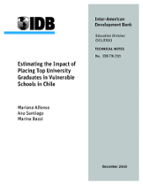Estimating the Impact of Placing Top University Graduates in Vulnerable Schools in Chile
Date
Dec 2010
Enseña Chile (ECh) is one model in the direction of helping close the achievement gap between low-income and high-income students in Chile, and is a first adaptation of the Teach for America (TFA) model in Latin America. This paper provides the first evidence on the impact of the implementation, and is the first evaluation of Teach For America model to shed light on how it affects non-cognitive skills. While it is still premature to speculate the full effect of ECh corps members on student academic achievement and cognitive and non-cognitive abilities, preliminary results from the follow-up wave seem to suggest that ECh-treated schools have made greater gains in Spanish and Mathematics test scores, as well as in non-cognitive abilities such as self-esteem, self-efficacy, intellectual and meta-cognitive abilities. One could expect these effects to help improve the overall comprehension of other subjects in the future. Further, the impact on motivation and studying abilities could also impact the student's schooling outcomes beyond their exposure to the Enseña Chile teachers. The forthcoming analysis will provide a fuller picture of the effect of ECh corps members on student achievement, cognitive and non-cognitive abilities, and a wide array of other measures, as well as the heterogeneity of the impacts and their effect over time.



